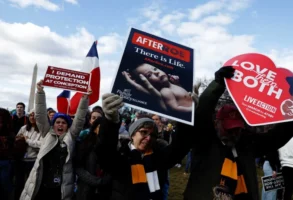
Published September 29, 2016
This past summer, three elderly members of my summer parish in rural Québec received a diagnosis of cancer at the local hospital, a small-town facility an hour’s drive from cosmopolitan Ottawa and even farther from hyper-secular Montréal. Yet after the diagnosis had been delivered, the first question each of these people was asked was “Do you wish to be euthanized?” That is what the new Canadian euthanasia regime has accomplished in just a few months: It has put euthanasia at the top of the menu of options proposed to the gravely ill.
Then there is Belgium, where, as reported in NR’s October 10 print issue, a minor was recently euthanized by lethal injection. You might think that, with the suburbs of Brussels having become the de facto capital of the ISIS caliphate (Euro-subdivision) and a birth rate so far below replacement level that native Belgians will soon be a rare anthropological specimen, the good burghers of Flanders and Wallonia would have something better to do than hasten the deaths of teenagers, even when the teenagers in their distress request just that. But if you thought that, then, as Richard Nixon famously said, “That would be wrong.”
The more apt mot about all of this lethality masquerading as compassion, however, is from the quotable quotes of another Richard, Richard John Neuhaus, who famously said of the morally egregious and its relationship to law, “What is permitted will eventually become obligatory.” Canada isn’t quite there yet, nor is Belgium; but they’re well on their way, not least because their single-payer health-care systems will increasingly find euthanasia cost-effective — and because the arts of pain relief combined with human support will atrophy in those countries as the “easy way out” becomes, well, easier and easier.
The citizens of Colorado might wish to keep all of this in mind when they vote this November 8 on Proposition 106, the Colorado “End-of-Life Options Act,” which is currently favored to win and thereby legalize physician-assisted suicide in the Centennial State.
The language deployed by supporters of Proposition 106 is appropriately duplicitous, in that the provision of death-dealing “medication” to a patient is described as another form of “palliative care.” Then it gets worse. An “adult,” according to the proposition, is anyone over 18 (vote, kill yourself, but don’t drink). The diagnosis of terminal illness must be attested by two physicians; but the language of the proposition is so loosely drawn that, in the case of a pancreatic-cancer patient, the certifying physicians could be a proctologist and an ear-nose-throat specialist of easy conscience. Similarly, the patient’s mental capacity to make the decision to kill himself must be attested by the attending and consulting physicians and not, as one might reasonably assume, by a trained mental-health professional such as a psychiatrist or psychologist. The latter are brought in to consult only when the proctologist and the ENT specialist deem it necessary, even though the latter have no recognized competence in identifying signs of depressions or other forms of mental illness.
Perhaps most weirdly (and chillingly) of all, the “dying medication” must be self-administered, meaning that no medical professional of any sort would be present when the patient self-euthanizes. Then, as if to double down on the Orwellian nature of the entire exercise, the death certificate would be required to list the underlying illness, not the auto-euthanization, as the cause of death. Proposition 106 thus mandates that a legal document in the state of Colorado contain a blatant lie.
Proposition 106 is full of what its proponents likely regard as circuit breakers to prevent “mistakes.” The wannabe auto-euthanizer must have the request for lethal “palliative care” witnessed by two persons, who will confirm that the request is being made voluntarily. The physician in charge of the case must offer the patient “multiple opportunities” to rescind the request. And so forth and so on, although we know from the experience of other euthanasia-friendly jurisdictions that this is all window dressing on what is in fact medical complicity in death-dealing, made even more odious by the fact that the entire exercise involves patients under extreme stress.
As the moral and linguistic confusions, subterfuges, and just plain falsehoods surrounding Proposition 106 graphically illustrate, euthanasia kills more than a disturbed human being facing life’s most challenging moment. It kills language, which means it kills public conversation, which means it is lethal to democracy. It kills the medical profession, which by inverting its most solemn obligations renders itself untrustworthy. It kills civil society, because the now-broken patient–doctor bond has been recognized for centuries as one of those res sacrae in temporalibus, those “sacred things in secular life,” in which the state has no business interfering (and most certainly no business subverting). And, over time, it kills the instinct, for caring for others in grave distress, that distinguishes human beings from other sentient creatures.
A Colorado brown bear sees in a wounded deer not a fellow creature to be helped but dinner. If Proposition 106 passes, something analogous to that brutish, subhuman relationship will obtain between doctors and their patients in Colorado, as those who were once considered fellow human beings to whom care was due are now taken to be problems to be technologically “solved” — or, worse, burdens to be lifted (from others, or from the state) by the self-administration of a lethal drug. And if that is what liberality, tolerance, and compassion have come to in the Centennial State, then Colorado is little more than nature red in tooth and claw, beneath a veneer of Rocky Mountain High civilization.
— George Weigel is the Distinguished Senior Fellow of Washington’s Ethics and Public Policy Center, where he holds the William E. Simon Chair in Catholic Studies.











